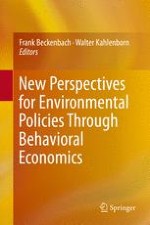2016 | OriginalPaper | Chapter
11. Implications of Behavioral Economics for Designing Adaptation Policies
Addressing Behavioral Barriers of Private Adaptation to Climate Change
Authors : Christian Kind, Jonas Savelsberg
Published in: New Perspectives for Environmental Policies Through Behavioral Economics
Publisher: Springer International Publishing
Activate our intelligent search to find suitable subject content or patents.
Select sections of text to find matching patents with Artificial Intelligence. powered by
Select sections of text to find additional relevant content using AI-assisted search. powered by
